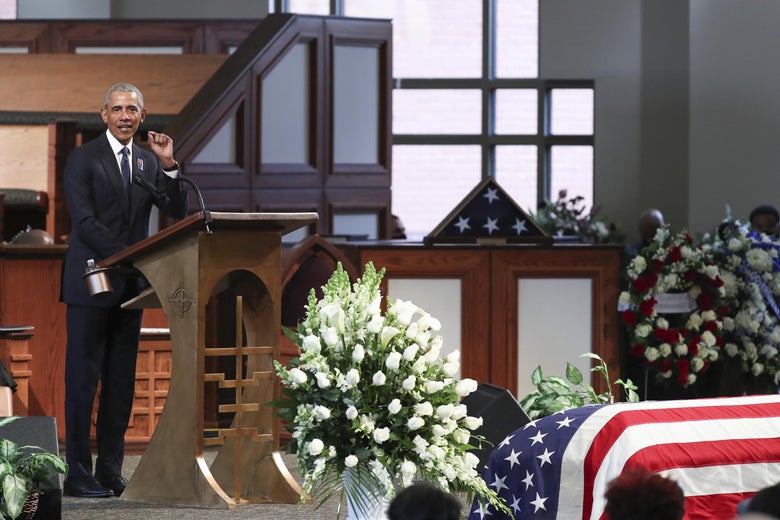
On Thursday, mourners honored civil rights icon and longtime Rep. John Lewis in Atlanta. At his funeral ceremony, the first Black president of the United States, Barack Obama, gave a eulogy that served both to pay tribute to one of the greatest leaders of the American civil rights movement and call for specific action to carry on that legacy. It will likely go down as one of Obama's greatest speeches, and it is worth watching in full.
In a speech that was almost surprising in its frank invocation of politics, Obama compared the brutal 1965 violence that nearly ended Lewis' life-police fractured his skull on the Edmund Pettus Bridge in Selma, Alabama-to the violent suppression of peaceful protests by federal officers today, called the Supreme Court's 2013 decision to gut the Voting Rights Act and the wave of voter suppression that followed "an attack on what John fought for," challenged hypocritical congressional leaders who have opposed a renewal of "the law that [Lewis] was wiling to die for" while issuing empty statements calling him a "hero," called for the end to the disenfranchisement of formerly incarcerated people, called for making Election Day a national holiday, called for statehood for D.C. and Puerto Rico, and called for "eliminating the filibuster, another Jim Crow relic, in order to secure the God-given rights of every American."
The barnburner of a political speech followed a powerful retelling of some of the highlights of Lewis' life and career, a narrative that laid the groundwork for Obama's call to action. It seemed clear that Obama was devastated by the death of a man he called a mentor.
"It is a great honor to be back at Ebenezer Baptist Church in the pulpit of its greatest pastor, Dr. Martin Luther King Jr., to pay my respects to perhaps his finest disciple," Obama said near the start of his remarks, his voice nearly breaking.
"I've come here today, because I, like so many Americans, owe a great debt to John Lewis and his forceful vision of freedom," Obama continued.
Obama then described Lewis' rise from a place of "modest means" in rural Troy, Alabama, where, as a boy, he eavesdropped on his father's discussions with friends about the murderous violence of the local Ku Klux Klan. As Obama described, after hearing King speak on the radio, Lewis became one of the greatest advocates for nonviolent resistance this country has seen.
"He helped organize the Nashville campaign in 1960. He and other young men and women sat at a segregated lunch counter, well-dressed, straight back, refusing to let a milkshake poured on their heads, or a cigarette extinguished on their backs, or a foot aimed at their ribs-refuse to let that dent their dignity and their sense of purpose," Obama said. "And after a few months, the Nashville campaign achieved the first successful desegregation of public facilities in any major city in the South. John got a taste of jail for the first, second, third, well, several times. But he also got a taste of victory and it consumed him with righteous purpose and he took the battle deeper into the South." Obama then described Lewis' work to desegregate buses in the South "months before the first official Freedom Rides."
But Obama's narrative was not just a powerful retelling of the life of an icon and founding member of the most democratic stage of American democracy-it tied Lewis' work in the 1960s to America's present-day struggle with authoritarianism and voter suppression.
"Sometimes, we read about this and we kind of take it for granted, or at least we act as if it was inevitable. Imagine the courage of two people Malia's age, younger than my oldest daughter, on their own, to challenge an entire infrastructure of oppression," he said. "John was only 20 years old, but he pushed all 20 of those years to the center of the table, betting everything, all of it, that his example could challenge centuries of convention and generations of brutal violence and countless daily indignities suffered by African Americans."
Finally, Obama turned to a powerful and direct political attack on present-day police brutality against Black people and voter and protest suppression efforts.
"Bull Connor"-the infamous Birmingham, Alabama, police commissioner who turned dogs and fire hoses on civil rights-era protesters-"may be gone, but today we witness, with our own eyes, police officers kneeling on the necks of Black Americans," Obama said, alluding to the murder of George Floyd. "George Wallace may be gone, but we can witness our federal government sending agents to use tear gas and batons against peaceful demonstrators," he added, alluding to the Trump administration-ordered assaults on protesters at Lafayette Square in D.C., and in Portland, Oregon.
Obama concluded by proposing that America honor the late congressman by enacting a new John Lewis Voting Rights Act and other measures to protect the vote, and by ending the "Jim Crow relic" of the filibuster if necessary to pass it.
Obama's was one of the finest funeral orations by an American president-a tribute to Lewis' life and a specific, actionable plea to protect the rights for which he and so many others fought and bled. History will determine whether his call-and that of Lewis-has been heard in the United States.